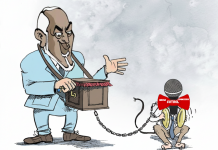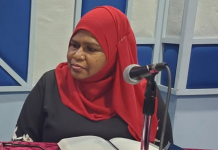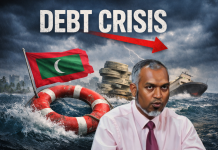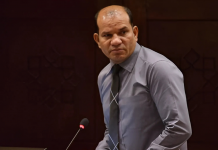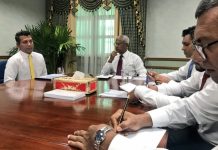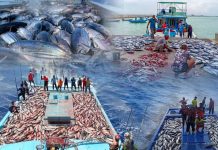Mohamed Nasheed is not a terrorist. Yet the first democratically elected president of the Maldives is imprisoned on a terrorism charge, as his country moves toward radicalization and repression.
Abdulla Yameen, who took over as president of this beautiful island nation, has undone the liberalization Nasheed promoted and justified the re-imposition of authoritarian rule as an effort to save Islam. Journalists, opposition politicians and peaceful protesters are behind bars. Judges are in the government’s pocket. And the country has become a source of Islamic State recruits.
It’s a case study in the fragility of new democracies and what can happen when the international community fails to protect them.
Sometimes called “the Mandela of the Maldives,” Nasheed is a political and religious moderate, Western-educated and a longtime champion of democracy, climate justice and human rights. He was arrested more than 20 times and tortured twice during the three-decade dictatorship of Maumoon Abdul Gayoom. In 2005, he founded the Maldivian Democratic Party, and in 2008 he defeated Gayoom in the country’s first multi-party elections.
During his presidency, Nasheed embarked on significant reforms, holding popular local elections under a new constitution and attempting to establish an independent judiciary. He also supported moderate Islam and encouraged citizens to reject extremism. “Should we ban music? Should we mutilate girls’ genitals? Should we allow 9-year-olds to be married? Should we forbid art and drawing?” he asked at a rally. “We can’t achieve development by going backwards to the stone age or being ignorant.”
Unfortunately, in response to his efforts to strengthen the Maldives’s democracy, remnants of the old regime orchestrated Nasheed’s removal from office at gunpoint in 2012. A year later, he ran for president again, but the highly politicized Supreme Court annulled the first-round results and rescheduled the election twice in order to ensure that the old dictatorship prevailed. Gayoom remains the head of their ruling political party, his half-brother Yameen is president, and his daughter is the country’s foreign minister.
Under their leadership, the government has fomented radicalization by failing to address high unemployment, intensifying domestic repression and embracing religious extremism. It has strengthened cooperation with hard-line Saudi Arabian clerics. And the vice president of the government’s own religious council openly called for the introduction of female genital mutilation. A growing number of parents are refusing to send their girls to school, according to the independent Human Rights Commission.
Equally worrying: The Maldives has become a hotspot for Islamic State recruitment, with more than 200 Maldivians estimated to have traveled to Syria and Iraq. That would be the highest rate of recruitment, per capita, in the world — equivalent to 160,000 Americans joining the militant group. Pro-Islamic State rallies have been held in the Maldives without any response by the police. And Islamic State fighters who returned home there have not faced prosecution.
Meanwhile, it is Nasheed who is accused of terrorism. He was convicted in March and sentenced to 13 years in prison for an alleged “terrorist abduction” of a judge in 2012. But his imprisonment is just an excuse to keep him out of government. Amnesty International called his trial “a travesty of justice.” Two of the three judges in his case served as witnesses against him, his lawyers were excluded from the courtroom, and all the proposed defense witnesses were rejected on the basis that they “would not be able to refute the prosecution’s case.” The United Nations ruled in October that it was “impossible to invoke any legal basis justifying [Nasheed’s] deprivation of liberty.” Secretary of State John Kerry in May condemned Nasheed’s imprisonment as “an injustice that must be addressed soon,” while on Capitol Hill senators Patrick Leahy (D-Vt.) and John McCain (R-Ariz.) introduced a resolution in November urging the immediate release of all the political prisoners in the Maldives.
Yesterday, the Maldives foreign ministry announced it would let Nasheed travel to Britain for surgery — but he must continue serving his sentence when he returns. While it is certainly welcome news that Nasheed, who has a spinal cord problem, will be able to get treatment, it’s clear the government’s calculus remains virtually unchanged.
Officials in Washington will need to back up their rhetoric with action if they want to see an end to the repression and a restoration of moderation through democratic means in the Maldives.
The United States should impose targeted financial sanctions and travel bans on senior regime officials and enablers. Such sanctions were effective in Belarus, Burma and Zimbabwe after those countries thwarted democracy and locked up political prisoners. And because the Maldives has a U.S.-dollar-based economy, it wouldn’t take much for targeted sanctions to bite. For example, sanctioning the handful of wealthy resort owners who finance the regime could have a major impact.
The European Parliament already adopted a resolution last month urging the European Union to impose targeted sanctions. If the United States moved forward, the E.U. and others likely would join.
I last saw Nasheed in October, when my co-counsel Amal Clooney and I visited him in Maafushi Prison. Dressed in a white linen shirt, he embraced us and thanked us for coming. Then he provided his analysis of the situation, explained how his imprisonment interacted with the country’s domestic politics and presented an incisive assessment of how to best engage countries in the region and globally.
Despite the terrible circumstances, he was remarkably confident and optimistic. He just needs some help returning the Maldives back to its people.


